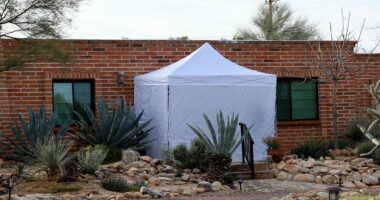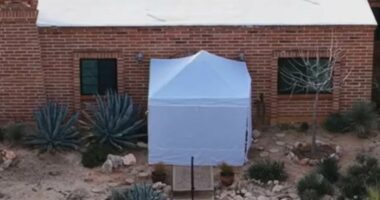Share this @internewscast.com
A controversial plan to release 45,000 gallons of radioactive water into the Hudson River has been approved in court.
A federal judge decided in favor of Holtec International, a company based in New Jersey, after it sued New York over the state’s prohibition on releasing radiological materials from the now-closed Indian Point nuclear plant.
The attorneys for Holtec maintained that New York exceeded its jurisdiction when it enacted the ‘Save the Hudson’ bill in August 2023, which was designed to safeguard the Hudson Valley from wastewater associated with the inactive nuclear site.
Governor Kathy Hochul approved the bill following unanimous approval in both chambers of the state legislature. This law updated environmental regulations and introduced penalties for violations to protect the Hudson River.
More than 100,000 people get their drinking water from the Hudson River, which has undergone extensive clean-up efforts over the past few decades.
However, US District Judge Kenneth Karas determined last week that New York’s prohibition was unconstitutional, emphasizing that only the federal government has the authority to regulate discharges from the retired nuclear plant.
The Indian Point nuclear power plant, located just south of Peekskill, permanently shut down in 2021 after nearly six decades of operation.
Shortly after the plant’s closure, the facility was acquired by Holtec International, a company that focuses on decommissioning nuclear plants and handling spent nuclear fuel.

Indian Point nuclear plant was shut down in 2021 after nearly 60 years of operation. Holtec purchased the facility, which it planned to dismantle

Holtec’s plan includes dumping tens of thousands of gallons of radioactive wastewater in to the Hudson River
Holtec has contended that the governance of wastewater discharges is the responsibility of the Nuclear Regulatory Commission (NRC) and the US Environmental Protection Agency.
Company officials also note that controlled releases have been standard practice at nuclear plants for decades. They also do not plan on releasing 45,000 gallons immediately.
Critics, however, contend that Holtec has other options, including storing the water on-site in sealed containers instead of releasing it into the Hudson.
Patrick O’Brien, director of government affairs and communications for Holtec International, told Patch that the company was disappointed that the 2023 bill was passed, saying: ‘The scientific facts show that discharge to the river is the safest option for dealing with the processed and treated water.’
‘Radiological discharge is the sole purview of the Nuclear Regulatory Commission and we hope the governor’s office reviews, concurs and vetoes the legislation based on the assessment that radiological discharge is federally preempted,’ O’Brien added.
‘The treated water is monitored and sampled to ensure that it meets regulatory requirements before it is released and will be a small fraction of the 3 millirem total annual limit imposed by the NRC.’
Westchester County Executive Ken Jenkins told the Hudson Independent: ‘The Hudson is the lifeblood of our region, a source of recreation, natural beauty and economic vitality, and we cannot allow it to become a dumping ground for radioactive waste.
‘Westchester residents, and all New Yorkers on both sides of the Hudson River, deserve better.’

More than 100,000 people get their drinking water from the Hudson River, which has undergone extensive clean-up efforts over the past few decades
Rockland County Executive Ed Day is also against the federal ruling.
‘I am deeply disappointed in the federal court’s decision to strike down New York’s Save the Hudson Bill, determining that federal law preempts New York law, which protected the Hudson River from radioactive waste dumping,’ he stated.
He added that New York’s Save the Hudson Bill has allowed ‘bald eagles, sturgeon, and even dolphins’ to make a return to the river.
‘It’s living proof of the river’s remarkable recovery and ongoing health. Allowing Holtec to discharge contaminated water would undo decades of progress and be nothing short of a travesty for our environment, our communities, and future generations,’ Day said.
In recent years, dolphins, including bottlenose and short-beaked common species, have been spotted again in the Hudson River, drawn by improving water quality, rising temperatures, and the resurgence of Atlantic menhaden, a key food source.
However, Holtec’s lawyers maintained that any radiation released from Indian Point’s wastewater would stay far below federal safety thresholds.
They also pointed out that during the plant’s decades of operation, millions of gallons of tritium-laced water had already been released into the Hudson River without exceeding regulatory limits.















